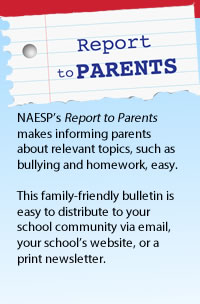Make This Your Staff’s Best Parent Involvement Year Ever
By John Wherry Communicator August 2013, Volume 36, Issue 12 There are three truths about parent involvement that principals and teachers should keep in mind when working with parents.
By John Wherry
Communicator
August 2013, Volume 36, Issue 12
There are three truths about parent involvement that principals and teachers should keep in mind when working with parents.
The purpose of parent involvement is to improve student achievement. That may sound obvious and simplistic, but success in any endeavor requires a clear focus on what you’re trying to achieve. While parent involvement offers many benefits to parents, students, and schools, the most important purpose must always be improving student achievement.
The purpose of maintaining good relationships with parents must be to encourage them to become and stay directly involved in helping their children learn. Many common activities, such as getting parent volunteers to help in the classroom, serve as field trip chaperones, or spearhead fundraising activities are only remotely related to building student achievement. Their impact pales in comparison to helping parents:
- Understand what their children are learning and doing in class and reinforce those things at home;
- Participate in family math, science, and reading nights at school; and
- Use materials to help motive their children to study more effectively or to learn how to tap into children’s interests to find things they will want to read.
Active outreach by teachers to parents can dramatically improve student achievement. A 2001 longitudinal study of standards-based reform practices conducted by Westat and Policy Studies Associates for the U.S. Department of Education tracked reading and mathematics achievement among students in 71 elementary schools as they progressed from third to fifth grade. The study found that in schools where teachers reported high levels of outreach to parents of low-achieving students, reading test scores grew at a rate 50 percent higher and math test scores at a rate 40 percent higher than in schools where teachers reported low levels of outreach. Successful outreach was defined simply as teachers being especially active in meeting face to face with parents, sending parents materials on ways to help their child at home, and contacting parents routinely and when their child was having problems.
Educators must overcome barriers that prevent parents from getting involved. Parent Institute studies find that the most frequent barriers include:
- Parents who do not feel that the school invites, welcomes, or encourages their involvement;
- Parents who do not believe they have the ability to help their child do better in school;
- Schools that do not provide practical advice to parents about what they can do to help children learn;
- Schools that fail to alert parents as soon as children begin to have problems;
- Lack of true, two-way, respectful partnership communication between parents and school personnel; and
- Parents who feel intimidated by and don’t trust the school.
Now is the best time of the year to brainstorm with your staff to develop plans at your school to overcome the common barriers that prevent parents from getting involved.
John H. Wherry is president of The Parent Institute.
Adapted from Principal, September/October 2009.
Copyright © 2013 National Association of Elementary School Principals. No part of the articles in NAESP magazines, newsletters, or website may be reproduced in any medium without the permission of the National Association of Elementary School Principals. For more information, view NAESP’s reprint policy.

